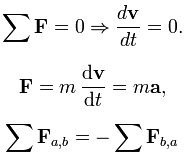You are viewing our site as an Agent, Switch Your View:
Agent | Broker Reset Filters to Default Back to ListThe Immutable Laws of Buying and Selling Real Estate
August 15 2011
Jay Thompson regularly blows us away with his insightful, clever prose. Here's another gem from his blog. You'll laugh; you'll cry; you'll nod your head in agreement.
 You’ve got Netwon’s Laws of Motion (depicted mathematically at the right). You’ve got the Laws of Thermodynamics, the economic Law of Supply and Demand, heck you’ve even got Murphy’s Law.
You’ve got Netwon’s Laws of Motion (depicted mathematically at the right). You’ve got the Laws of Thermodynamics, the economic Law of Supply and Demand, heck you’ve even got Murphy’s Law.
Why aren’t there any Laws of Real Estate?
Well, there are now.
First Law of Real Estate: It doesn’t matter what your neighbors home sold for in the past. The corollary to the First Law of Real Estate is that it doesn’t matter what your own home was worth in the past.
It. Doesn’t. Matter. Home prices are dynamic. They rise and fall, wax and wane, and can change daily – seemingly on a whim. What a home was worth five years ago, last month or yesterday has no bearing on what it is worth today. If you are in the Phoenix real estate market, this can be a difficult pill to swallow. You need to stop thinking about “woulda, coulda and shoulda”. You didn’t sell your home two years ago when you could have gotten twice what you’ll get today, so getting upset about what it sells for today simply is a waste of energy. You can’t go back in time (according to Einstein, a pretty sharp dude) and sell your home, so stop worrying about it.
Second Law of Real Estate: A home is worth what a ready, willing and able buyer will pay for it. In today’s market, “able” is usually the limiting factor. Blame the banks.
Your real estate agent can’t tell you what your home is worth. Zillow and other automated valuation models (AVMs) certainly can’t tell you what a home is worth. A home appraiser can’t even tell you (though the bank will listen to an appraiser and not loan you more than what they claim the home is worth).
A real estate agent can give you a general idea of what a home may sell for. Software valuations are fun to play with and are reasonable ways to look at pricing trends, but should never be relied on to price a home. And appraisers do very good work at drilling down into a home’s value. But the bottom line is, unless you find a buyer that is ready, willing and able to buy your home – at the price they deem appropriate – it’s not going to sell. Ever. (With the possible exception of being “sold” back to the lender at foreclosure).
In short, it doesn’t matter what you think your home is worth. And it certainly doesn’t matter what you wish your home was worth. What matters is what a buyer thinks it’s worth. And whether a lender will approve a loan at that amount.
Third law of Real Estate: Your home improvements will not make your home value increase in an amount equal to or greater than what you paid for the improvements. The corollary to the Third Law of Real Estate is that money spent on maintaining your home adds zero to the home’s value (though maintenance will help keep your home value from decreasing).
Have a $25,000 swimming pool installed, and your home value is not auto-magically increased by $25,000. Depending on the pool, the location, nearby amenities and the direction the prevailing wind blows, your $25K pool addition might add 5 or 10K to the value of the home. Or it may in fact, add 0K. Some improvements, especially kitchen and bathroom improvements, tend to have higher rates of payback than others. But there is no improvement that adds equal or more value to a home than what it cost.
That shiny new water heater you added last year, the pretty new roof or that $3,000 air conditioner compressor that was installed last week add ZERO dollars to your home’s value. Oh the fact the water heater, AC and/or roof is newish may appeal to some buyers. That may well be what triggers their decision to buy your home versus another one, but they don’t make the home intrinsically more valuable . Does it suck to dump three grand into an air conditioning repair on a home you’re not even living in? Hell yes it sucks. But try selling a home in Phoenix without A/C. Or without a water heater. Or a roof. You’d have to discount the price of the home at a far greater amount than those repairs would cost in order to sell a home missing such basic functionality. And you’ll cut your potential buyer pool significantly without those mandatory “features”. If you need to make fundamental repairs, you’re just going to have to suck it up and make them and not expect to recoup any of that money.
Fourth Law of Real Estate: The odds of getting an offer on your home increase exponentially if your real estate agent goes out of town. The corollary to the Fourth Law of Real Estate is your dream home will come on the market 15 minutes after your agent boards a plane.
Seriously! Ask any agent what happens to their business when they go to a conference. Or on a vacation – whatever that means. They’ll tell you that business invariably increases when they leave town. Usually in direct proportion to the level of inconvenience it requires to respond to offers, buyer inquiries, etc. So if you really want to get an offer on your home that is for sale, send your agent on a trip to Hawaii. It’ll work every time…











